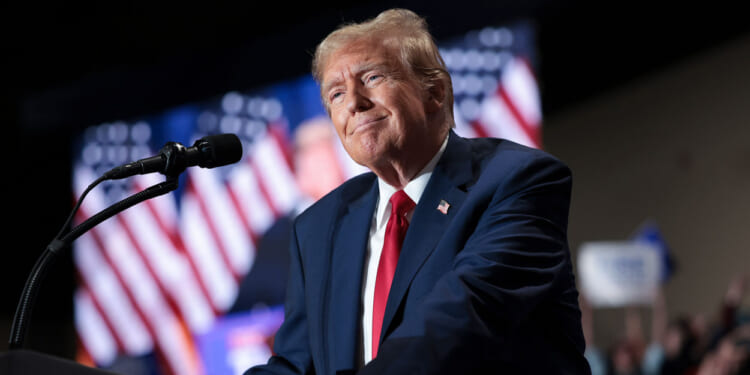The Supreme Court’s unanimous decision Monday shut down state efforts to remove former President Donald Trump from the ballot but left a few options open for Democrats seeking to disqualify him, which some began exploring soon after the ruling dropped.
Democratic Maryland Rep. Jamie Raskin already said he is working on a bill that would create a pathway to disqualify candidates, stating it is “good news” the Supreme Court did not challenge the Colorado court’s finding that Trump engaged in insurrection. Rather, the Supreme Court ruled against Colorado on the basis that it is Congress, not the states, that has the power to enforce Section 3 of the 14th Amendment against federal officials and candidates.

“[T]he Supreme Court punted and said, it’s up to Congress,” Raskin said on CNN Monday following the ruling.
The ruling kept open the option of states enforcing Section 3 of the 14th Amendment against their own officials and candidates, as Citizens for Responsibility and Ethics, the left-wing group that filed the action against Trump in Colorado, has already been filing lawsuits to do. For federal officials, it held Congress is responsible for enforcement.
“I am working with a number of my colleagues, including Debbie Wasserman Schultz and Eric Swalwell, to revive legislation that we had to set up a process by which we could determine that someone who committed Insurrection is disqualified by Section 3 of the 14th Amendment,” Raskin said Monday.
Democratic California Rep. Zoe Lofgren likewise told Politico Monday that it “does not at first read appear that the court indicated a viable path to implement Section 3 of the 14th Amendment absent enactment of a law outlining procedures to do so.”
Before the ruling, some senior Democrats suggested in comments to The Atlantic that they would not certify a Trump victory on Jan. 6, 2025, if the Supreme Court failed to provide clear guidance on whether or not he committed an insurrection. The Supreme Court’s Monday ruling put boundaries on how Congress can enforce Section 3: requiring it be enforced by legislation that shows “congruence and proportionality” to the conduct in question.
Notre Dame Law professor and election law expert Derek Muller told the Daily Caller News Foundation rejecting certification remains “possible” but would be an “uphill climb” for Democrats.
“The court seems to suggest that legislation to enforce Section 3 must be appropriately tailored,” he said. “It’s not clear the Electoral Count Reform Act, if used to enforce Section 3, would fit that bill.”
“That said, Democrats objected or attempted to object to election results in 2000, 2004, and 2016, so I think it remains entirely possible that if Trump wins, at least some will attempt to do so,” he continued. “But any objection even to get a debate now needs 20% of each chamber to sign an objection, and to sustain an objection requires a majority in both houses, which seems nearly impossible.”
Some legal scholars thought the Supreme Court intended to shut the option down by specifying the kind of legislation required. The liberal justices seemed to have similar concerns when they wrote the majority’s opinion rules out “enforcement under general federal statutes requiring the government to comply with the law.”
“By holding that Section 5 enforcement legislation is the sole mechanism by which federal office-holders can be disqualified, the decision forestalls such potential scenarios as a Democratic Congress refusing to certify Trump’s election,” George Mason University law professor Ilya Somin wrote for Reason.
Practically, Hans von Spakovsky, senior legal fellow at The Heritage Foundation’s Edwin Meese III Center for Legal and Judicial Studies, told the Daily Caller News Foundation he doesn’t think Democrats have the votes to take such action.
“[Raskin] doesn’t have a hope of passing any such bill unless Democrats get rid of the filibuster in the Senate,” he told the Daily Caller News Foundation. “Moreover, if he writes a bill that specifically goes after Trump, he may run into constitutional problems with a violation of the ban in Article I, Section 9 on bills of attainder and ex post facto laws.”
Regardless, any effort Congress makes is likely to spark legal challenges of its own, on which the Supreme Court will have the “last word,” University of California, Los Angeles law professor Rick Hasen wrote Monday.
“We may well have a nasty, nasty post-election period in which Congress tries to disqualify Trump but the Supreme Court says Congress exceeded its powers,” Hasen said.
Have an opinion about this article? To sound off, please email letters@DailySignal.com, and we’ll consider publishing your edited remarks in our regular “We Hear You” feature. Remember to include the URL or headline of the article plus your name and town and/or state.












